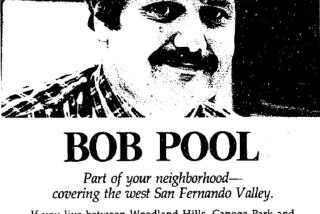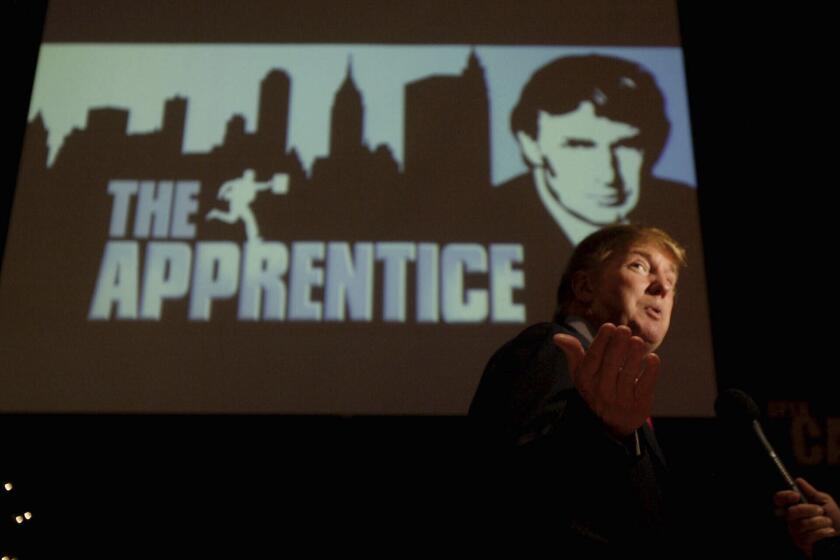Ray Bradbury, idol -- and friend
Ray, darlin’.
That’s what I called him. It was, he had told me, what an Irish cabbie had called him, back when Ray Bradbury was still rather a lad of a writer, albeit an acclaimed one, and had gone off to Ireland to work on the screenplay for the 1956 movie “Moby Dick.” The John Huston film starred Gregory Peck as the divinely mad Captain Ahab and Orson Welles in a harrowing cameo as the preacher, and the epic donnybrooks between Ray and Huston were probably just as cinematic as anything that ended up on film.
Some years back, Ray had invited me to join him at the Falcon Theatre on Riverside Drive to see a production of his marvelous play, “Falling Upward,” drawn from his days in County Cork and set in a pub not unlike the one where he had spent assiduous time absorbing Irish culture and voices and a bit of the local brew.
Ray said that the Irishman who had driven him to and from work on “Moby Dick” every day had taken to calling him “Ray, darlin’.” And from then on, so did I.
If you are a lover of books and living in Los Angeles, you probably ran across Ray Bradbury. He admired newspapers -- he’d stood on street corners and hawked L.A.’s many newspapers as a boy -- but he was even more a devotee of books, of book lovers and of libraries.
If the only thing he’d ever written had been “Fahrenheit 451,” about the soul’s longing for literature, he would be justly renowned. Ray wrote “Fahrenheit 451” on typewriters he rented at UCLA, the kind you used to be able to drop coins in for an hour’s use of them; the going rate may have been two bits for 60 minutes. But his writing spanned the globe, in myriad languages, and explored time and space and the interiors of the mind and the heart.
Of course all of us had read Bradbury as kids; “Fahrenheit 451” was astonishing and revelatory, and “Something Wicked This Way Comes” was as deep a journey into the longings of youth and age as I’d read. He once told me that of the films made of his books, “Wicked” was the one he liked best. His father, like mine, had been a lineman in the Midwest, and this mild, middling setting, this supposedly placid normality of Middle America, made the contrasts in his stories all the more fantastic.
“Science fiction” was too narrow, too dismissive a name for what Ray did, and he didn’t like the label either. His skills transcended the genre, leaped across many genres, comic and tragic, plays, TV, poetry, epigrams, novels, novellas, a stupefying output. And his vigor was legendary. I remember being gobsmacked when, six years ago, at age 85, Ray told me he was working on an opera.
He was a thoroughgoing Angeleno, and he proselytized his love of the place -- and shared his frustrations over it, in venues like op-ed pieces in The Times. He scolded the Reagan administration in 1985, for example, for not doing enough to encourage trains and train travel. This was not nostalgia, he wrote, but highly evolved, advanced thinking. “When I get on a French train, or dream of the Tokyo-Osaka express,” he wrote, “it is not the Past whispering but the Future shouting at me.”
He never drove, never had a license, was all for public transit. The only part of L.A. life he never did experience was the odd Joan Didion exaltation of steering a car in swoops and arcs along the loops of the freeways, but he certainly didn’t miss it. Maybe that accounted for his serenity of mien, that contemplative time, the “philosophical retreat,” as he wrote of his train travel, that the rest of us, belted behind the wheel, did not get.
From the Los Angeles Times Festival of Books’ earliest days, Ray was a stalwart, showing up every year, until his health prohibited, and patiently signing book after book for fan after fan, when other authors, lesser or younger or both, would have given up.
I don’t know where I got the nerve to ask him to write a little blurb for my first book, “Rio L.A.: Tales From the Los Angeles River,” in 2001. “Of course,” he said. I’d expected something like, “Nice job, Patt.” This was a busy man, much in demand, by others and by the demands he put on himself in his writing. Instead, I was overwhelmed when he generously wrote, “Patt Morrison writes so well she proves there is water in the L.A. River 425 days a year. She proves it by jumping in and swimming from San Fernando to Ballona Creek. An Olympic champ! Brava!”
Ray was in the founding core of the small book group that Mayor Dick Riordan and I began nearly 20 years ago. I wondered whether he’d enjoy the task of reading and critiquing other writers’ work, but he did, with zest, until he developed some ailment with his legs and couldn’t join us any longer, especially once he’d lost his darlin’, his wife, Maggie, in 2003.
Each year he sent out a Christmas newsletter, always stamped with a lovely Christmas-themed painting, like the Sassoferrato Madonna hanging in Hearst Castle.
This morning, after I heard he had died, I scrumbled around and found one of them. For Christmas 2010, his annual poem began: “I am God’s greatest basking hound, I’ve found the sun and kept it in my blood, I sleep it in my brooding veins, Take pains to sunflower its flight, Burn night away by lifting head to follow, Then swallow up swift drifts of light.”
You read it aloud and it is rich and nourishing, like all the others, like everything he wrote, like Ray himself, supremely humane and irresistibly human.
RELATED:
Ray Bradbury goes to the movies, and vice versa
More to Read
A cure for the common opinion
Get thought-provoking perspectives with our weekly newsletter.
You may occasionally receive promotional content from the Los Angeles Times.











